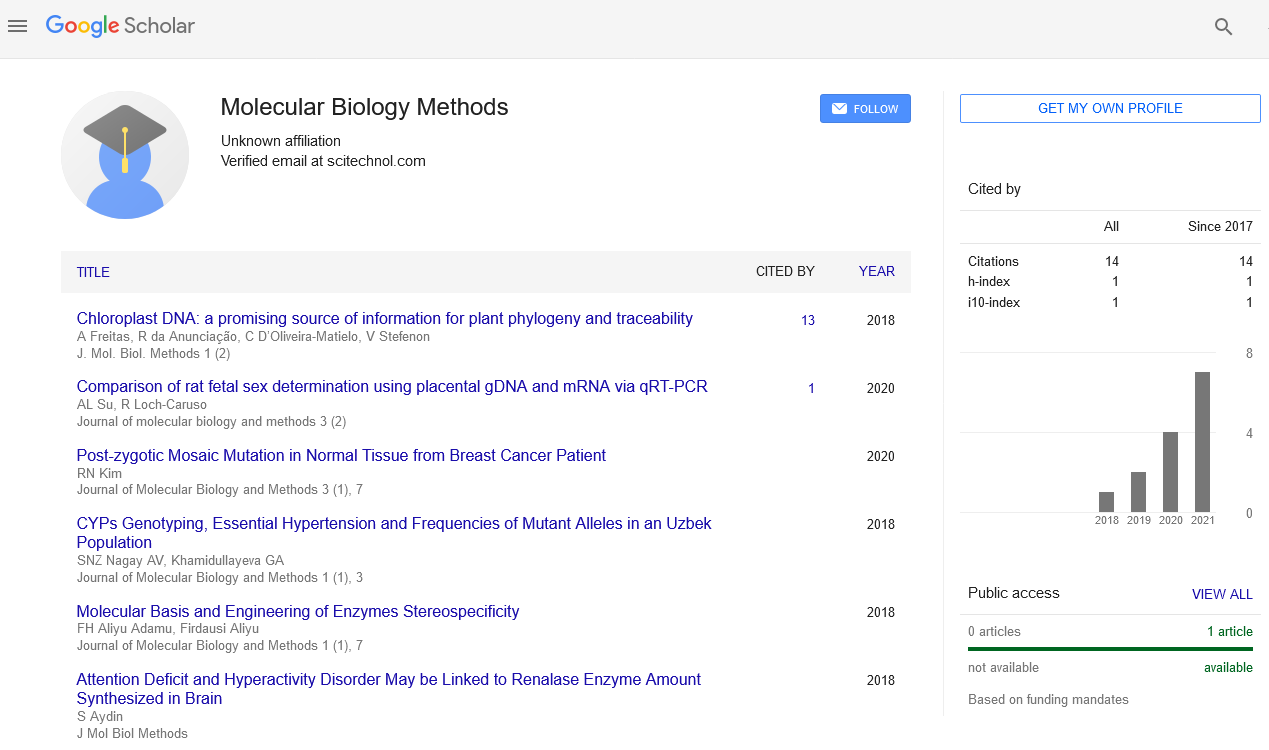Commentary, J Mol Biol Methods Vol: 5 Issue: 2
A Pilot Study to Improve Outcomes of Poor Prognosis in Coronavirus Patients
Yasuhisa Fujibayashi*,
Department of Molecular Imaging, Fukui Medical University, 23-3, Shimoaizuki, Matsuoka, Yoshida, Fukui, Japan
Corresponding author: Yasuhisa Fujibayashi
Department of Molecular Imaging, Fukui Medical University, 23-3, Shimoaizuki, Matsuoka, Yoshida, Fukui, Japan
E-mail: yasufbhi@frsa.med.jp
Received date: March 03, 2022, Manuscript No. JMBM-22-62472;
Editor assigned date: March 05, 2022, Manuscript No. JMBM-22-62472 (PQ);
Reviewed date: March 14, 2022, Manuscript No. JMBM-22-62472;
Revised date: March 24, 2022, Manuscript No. JMBM-22-62472 (R);
Published date: March 31, 2022, DOI:10.4172/JMBM.1000116
Citation::Fujibayashi Y (2022) A Pilot Study to Improve Outcomes of Poor Prognosis in Coronavirus Patients. J Mol Biol Methods 2022, 5:2
Keywords: Covid-19, Mesenchymal stem cells, Cytokines
Introduction
The Covid-19 sickness is a worldwide pandemic, with the main case analyzed in December 2019, as revealed by World Wellbeing Organization (WHO). In 17% of patients, COVID-19 causes extreme intense respiratory misery disorder (ARDS) because of arrival of a lot of favorable to incendiary cytokines and chemokines in the lungs. In a review observational review from Milan, 9% individuals, who tried positive for COVID-19, required ICU care with respiratory support. The interest for ICU beds, and medical care work force carried huge over-burden to support the care of these patients. Look for viable treatments is in progress. Be that as it may, extreme disease in COVID-19 actually leads to the inescapable fatalities with the current accessible therapies.
Mesenchymal Stem Cells (MSCs) have been secluded around a long time back. There are north of 55,000 articles distributed on MSCs. In addition, mitigating and invulnerable modulatory properties of MSCs have been well studied. MSC's do not work in that frame of mind as begetters for tissues, neither in the ordinary state nor in infection or injury. Thusly, MSC's are not undifferentiated cells. Exogenously managed MSCs are restorative. They produce positive remedial results by discharging bioactive variables that show immunomodulatory, and regenerative impacts including manufacturing, and discharging anti-microbial proteins, where they focus on locales of injury or disease. Hence, Arnold Caplan has proposed as of late to change the name of MSCs to Medicinal Signaling Cells. Over the course of the last 10 years, the accentuation has moved toward tackling the pMSCs' capacity to create elements, and cytokines that animate natural tissue fix, balance aggravation, and safe responses. MSCs express capacity on Toll-like receptors (TLRs). Setting off various TLRs, contingent upon openness times advance either favorable to or calming capacity in MSCs. Pre-clinical investigations showed that most of imbued MSCs at first circulated in the lungs.
Ensuing investigations showed further developed pneumonic capacities starting soon after organization without any proof of pneumonic danger. These investigations demonstrated the neighborhood advantageous MSCs-interceded impact on pneumonic airways. A new pilot concentrate on structure China investigated the remedial results of MSC transplantation in seven unfortunate visualizations.
Coronavirus patients with pneumonia. The outcomes uncovered that MSC transplantation was protected, and viable treatment choice. The fringe lymphocytes expanded after the treatment, and the overactivated cytokine-discharging insusceptible cells vanished in 3-6 days. A gathering of administrative DC cell populace emphatically expanded. In the interim, the level of TNF-α is essentially diminished, while IL-10 expanded in the MSCs treatment bunch contrasted with the fake treatment control bunch. Moreover, the quality articulation profile showed MSCs were ACE2-and TMPRSS2-which demonstrated MSCs were liberated from COVID-19 infection.
Here, we report the consequences of our pilot study to evaluate the steady clinical restorative impacts of MSC transplantation on COVID-19 extreme/basically serious patients. We exhorted a clinical application convention, and calculation by assessing the unfortunate prognostic markers essentially related by MSC transplantation during the pandemic to forestall the over-burden in ICU facilities under ventilation support, as well as, to abbreviate the hospitalization time.
A pilot investigation of intravenous MSC transplantation was performed on eight patients with COVID-19 contaminated pneumoniain the ICU. These eight patients were clinically heterogeneous, and lethargic to exhorted clinical treatment. The patients were selected into the review with every family's marked composed assent structure, in agreement with the Declaration of Helsinki.
Eight COVID-19 tainted pneumonia patients in the Marmara University Hospital ICU were remembered for this review. They were followed with one of a kind COVID-19 clinical treatment calculations affirmed with Turkish Ministry of Health (exhorted clinical treatment). Two patients were assessed as extreme and six were selected as basically serious into the study. Each of the eight patients were clinically heterogeneous thinking about their comorbidities and segment attributes.
 Spanish
Spanish  Chinese
Chinese  Russian
Russian  German
German  French
French  Japanese
Japanese  Portuguese
Portuguese  Hindi
Hindi 